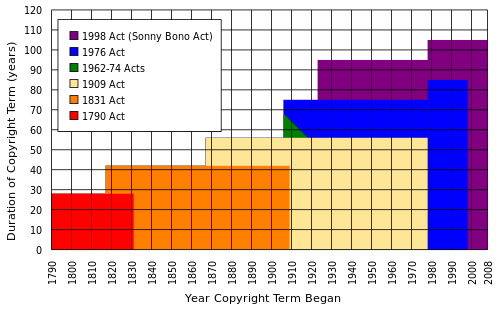Copyright term

Copyright term is the length of time copyright subsists in a work before it passes into the public domain.
Length of copyright
Copyright subsists for a variety of lengths in different jurisdictions. The length of the term can depend on several factors, including the type of work (e.g. musical composition or novel), whether the work has been published or not, and whether the work was created by an individual or a corporation. In most of the world, the default length of copyright is the life of the author plus either 50 or 70 years. In the United States, the term for most existing works is a fixed number of years after the date of creation or publication. In most countries (for example, the United States[1] and the United Kingdom[2]) copyright expires at the end of the calendar year in question.
The length and requirements for copyright duration are subject to change by legislation, and since the early 20th century there have been a number of adjustments made in various countries, which can make determining the copyright duration in a given country difficult. For example, the United States used to require copyrights to be renewed after 28 years to stay in force, and formerly required a copyright notice upon first publication to gain coverage. In Italy and France, there were post-wartime extensions that could increase the term by approximately six years in Italy and up to about 14 in France. Many countries have extended the length of their copyright terms (sometimes retroactively). International treaties, like the Berne Convention, establish minimum terms for copyrights, but these only apply to the signatory countries, and individual countries may grant longer terms than those set out in a treaty.[3]
Reception and discussion
Discussions about the optimal length of the copyright term is significant part of public and scientific reception.[4]
Recently in 2009 a paper by Rufus Pollock of University of Cambridge scientifically quantified the optimal copyright term length via an economical model with empirically-estimable parameters as duration of 15 years, significantly shorter than any currently existing copyright term.[4][5][6]
See also
- History of copyright law
- List of countries' copyright length
- Perpetual copyright
- Rule of the shorter term
References
- ↑ 17 U.S.C. § 305
- ↑ The Duration of Copyright and Rights in Performances Regulations 1995, part II, Amendments of the UK Copyright, Designs and Patents Act 1988
- ↑ Nimmer, David (2003). Copyright: Sacred Text, Technology, and the DMCA. Kluwer Law International. p. 63. ISBN 978-90-411-8876-2. OCLC 50606064.
- ↑ 4.0 4.1 Watt, Richard (Sep 26, 2014). "Handbook on the Economics of Copyright: A Guide for Students and Teachers". Edward Elgar Publishing,. Retrieved 2015-01-11.
- ↑ Pollock, Rufus (2007-10-01). "OPTIMAL COPYRIGHT OVER TIME: TECHNOLOGICAL CHANGE AND THE STOCK OF WORKS". University of Cambridge. Archived from the original on 2013-02-21. Retrieved 2015-01-11.
The optimal level for copyright has been a matter for extensive debate over the last decade. Using a parsimonious theoretical model this paper contributes several new results of relevance to this debate. In particular we demonstrate that (a) optimal copyright is likely to fall as the production costs of `originals' decline (for example as a result of digitization) (b) technological change which reduces costs of production may imply a decrease or a decrease in optimal levels of protection (this contrasts with a large number of commentators, particularly in the copyright industries, who have argued that such change necessitates increases in protection) (c) the optimal level of copyright will, in general, fall over time as the stock of work increases.
- ↑ Pollock, Rufus (2009-06-15). "FOREVER MINUS A DAY? CALCULATING OPTIMAL COPYRIGHT TERM". University of Cambridge. Archived from the original on 2013-01-12. Retrieved 2015-01-11.
The optimal term of copyright has been a matter for extensive debate over the last decade. Based on a novel approach we derive an explicit formula which characterises the optimal term as a function of a few key and, most importantly, empirically-estimable parameters. Using existing data on recordings and books we obtain a point estimate of around 15 years for optimal copyright term with a 99% confidence interval extending up to 38 years. This is substantially shorter than any current copyright term and implies that existing terms are too long.